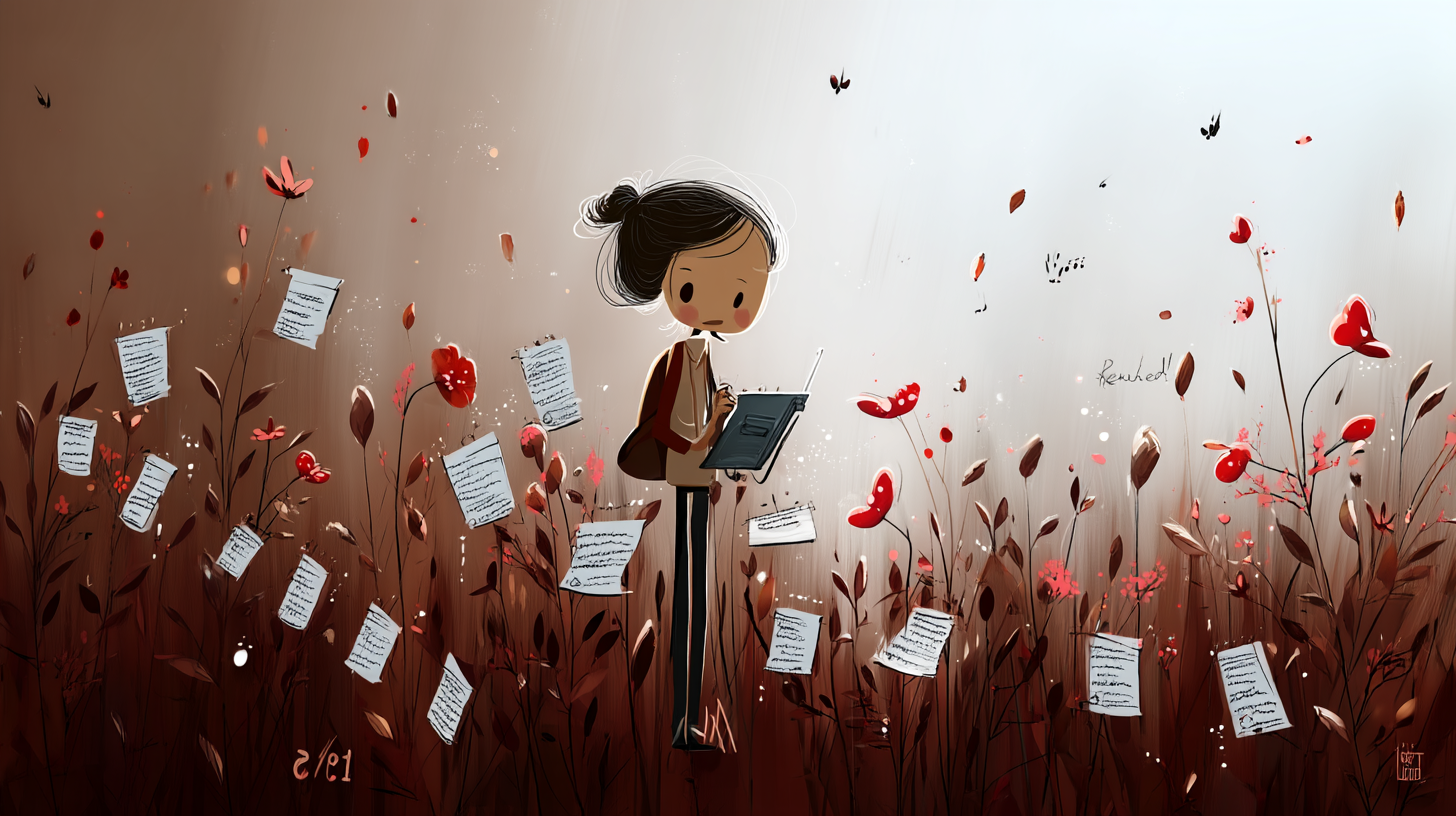“Research” means checking something carefully to know more about it.
「research」は何かをよく知るために調べることです。
以下は英単語 “research” に関するストーリー型学習コンテンツです。まずは大枠の意味を理解して最後の文章で確認しましょう。
主な意味(main meaning)
| 品詞 | 意味(簡潔) | 発音記号 | 英語例文 |
|---|---|---|---|
| 名詞 | 調査や研究 | /ˈriː.sɜːtʃ/ | He is doing research on climate change. |
| 動詞 | 調査・研究する | /rɪˈsɜːtʃ/ | She researched the history of the town. |
語源(etymology)
ラテン語「recercare(繰り返し探す)」が語源。
「re(再び)+cercare(探す)」という構造から、「深く調べる」という核のイメージ。
類義語(synonyms)
| 類義語 | 英文例文 |
|---|---|
| study | She is doing a study on sleep habits. |
| investigation | The police started an investigation. |
| analysis | His analysis of the data was impressive. |
| exploration | The scientist led an exploration of the forest. |
| inquiry | The government launched an inquiry into the case. |
反義語(antonyms)
| 反義語 | 英文例文 |
|---|---|
| ignorance | His ignorance of science surprised the teacher. |
| assumption | She made a decision based on assumption, not facts. |
コロケーション(collocations)
| コロケーション | 英文例文 |
|---|---|
| conduct research | We need to conduct research before starting. |
| research project | He is working on a research project about health. |
| research paper | I submitted my research paper last week. |
| research findings | The research findings were surprising. |
| scientific research | Scientific research takes time and effort. |
2項表現(binomials)
| 2項表現 | 英文例文 |
|---|---|
| trial and error | We found the solution through trial and error. |
| facts and research | Decisions should be based on facts and research. |
英語ストーリー(english story)
Title: A New Discovery at Work
Mika was a young employee at a technology company. One day, her manager asked her to conduct research on how their app could help elderly users. Mika felt excited. She began by reading past research papers and collecting facts and research findings from other companies.
She didn’t just guess or make an assumption. She believed in working with facts and research. She also started a small research project with her team. They used trial and error to test the app with older users.
Mika’s team made a lot of progress. They did a detailed analysis of the results and wrote a new study. Even the company director praised her scientific research.
Through this experience, Mika learned that good research takes time and effort, but it leads to real understanding.
和訳
タイトル:職場での新しい発見
ミカはテクノロジー会社の若い社員でした。ある日、マネージャーが「高齢者に役立つアプリの使い方について**調査(research)をしてほしい」と頼みました。ミカはワクワクしました。彼女は過去の研究論文(research papers)を読み、他社の調査結果(research findings)**を集めました。
彼女は**推測(assumption)**ではなく、**事実と調査(facts and research)に基づいて行動しました。そして、チームと一緒に小さな調査プロジェクト(research project)を始めました。彼らは試行錯誤(trial and error)**でアプリを高齢者に試してもらいました。
チームは大きく進歩しました。結果を詳しく**分析(analysis)し、新しい研究(study)を作成しました。会社の社長も彼女たちの科学的調査(scientific research)**を褒めてくれました。
この経験を通じて、ミカは良い**調査(research)**には時間と努力が必要だが、本当の理解につながることを学びました。
Q&A
「research」と「study」の違いは?
「research」は新しい知識や事実を見つけるための深い調査を指します。一方、「study」は教科書や本などを使って知識を学ぶこと全般を指します。例えば、科学者が実験を通して調べるのは「research」、学生が教科書を読むのは「study」です。
「research」と「investigation」の違いは?
「investigation」は事件や問題の原因を明らかにするための調査を意味し、警察や記者が使うことが多いです。一方、「research」は学術的・科学的な調査で、知識を広げたり理解を深めたりする目的で行われます。
「research」と「analysis」の違いは?
「analysis」はすでに集めたデータや情報を細かく分けて考えることです。「research」はその情報を集める段階も含む広い活動です。つまり、「research」が全体、「analysis」はその一部と考えられます。
「research」と「exploration」の違いは?
「exploration」はまだ知られていない場所やことがらを初めて探すことです。宇宙探査や新しい土地を調べる場合に使われます。「research」は情報を深く調べることに重点があり、物理的な探検とは限りません。
「research」と「inquiry」の違いは?
「inquiry」は質問や問い合わせを通じて真実を探すことです。政府や組織が何か問題について正式に調べる時に使います。「research」は個人や研究者が学問的な方法で調べることを意味します。
「conduct research」と「do a study」の違いは?
どちらも調査を行うことを意味しますが、「conduct research」はより正式で学術的な場面で使われます。「do a study」は比較的カジュアルで、特定のテーマに関する調査を指す場合が多いです。
「research findings」と「analysis results」の違いは?
「research findings」は調査の中で新しく見つかった事実や結論を指します。「analysis results」は分析作業を通して得られた数値や関係性など、より具体的な結果を指します。



コメント